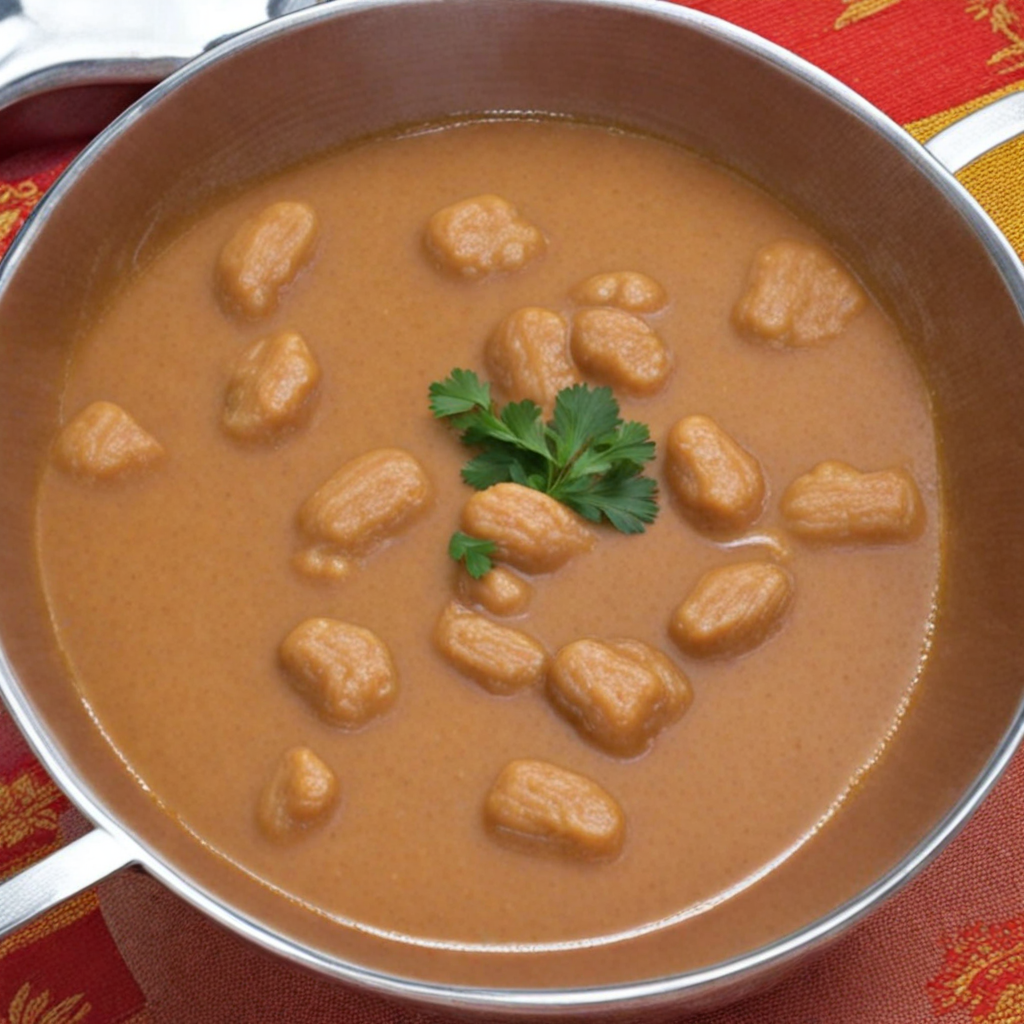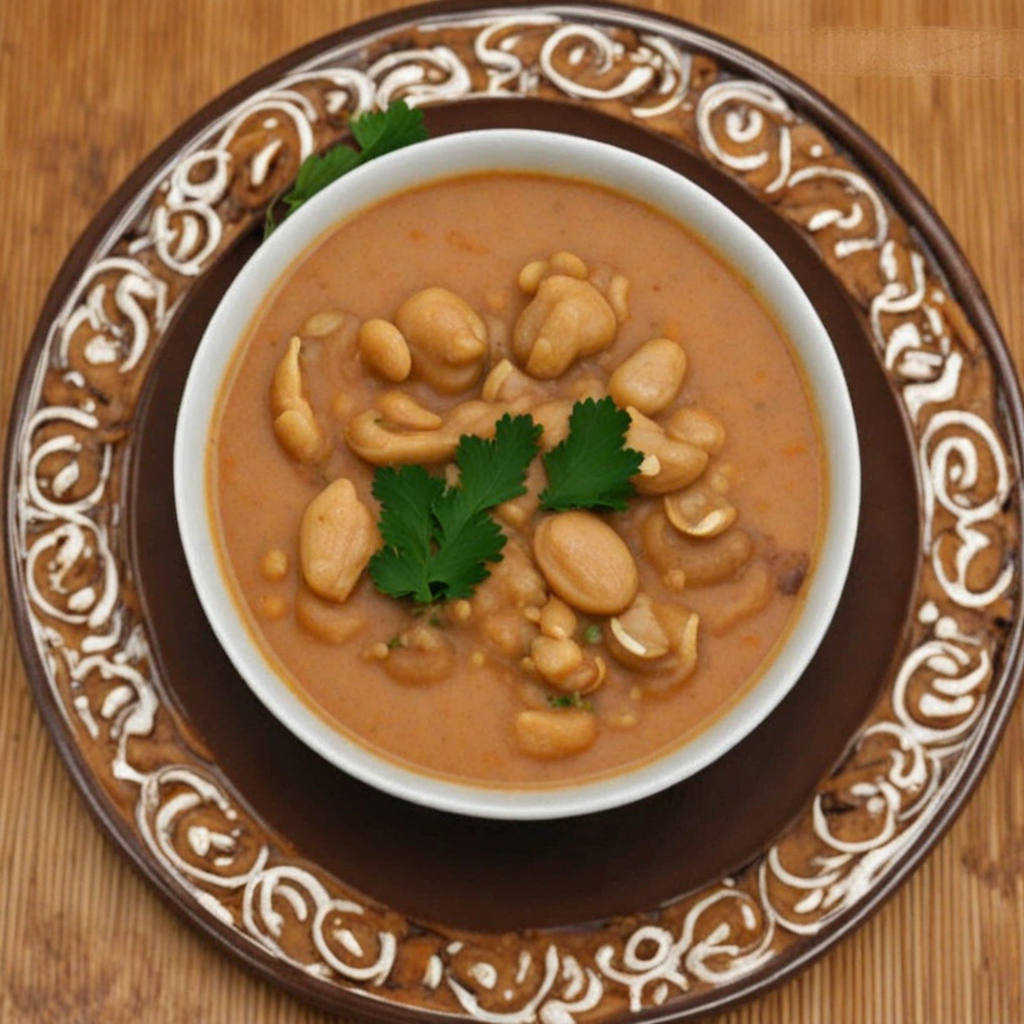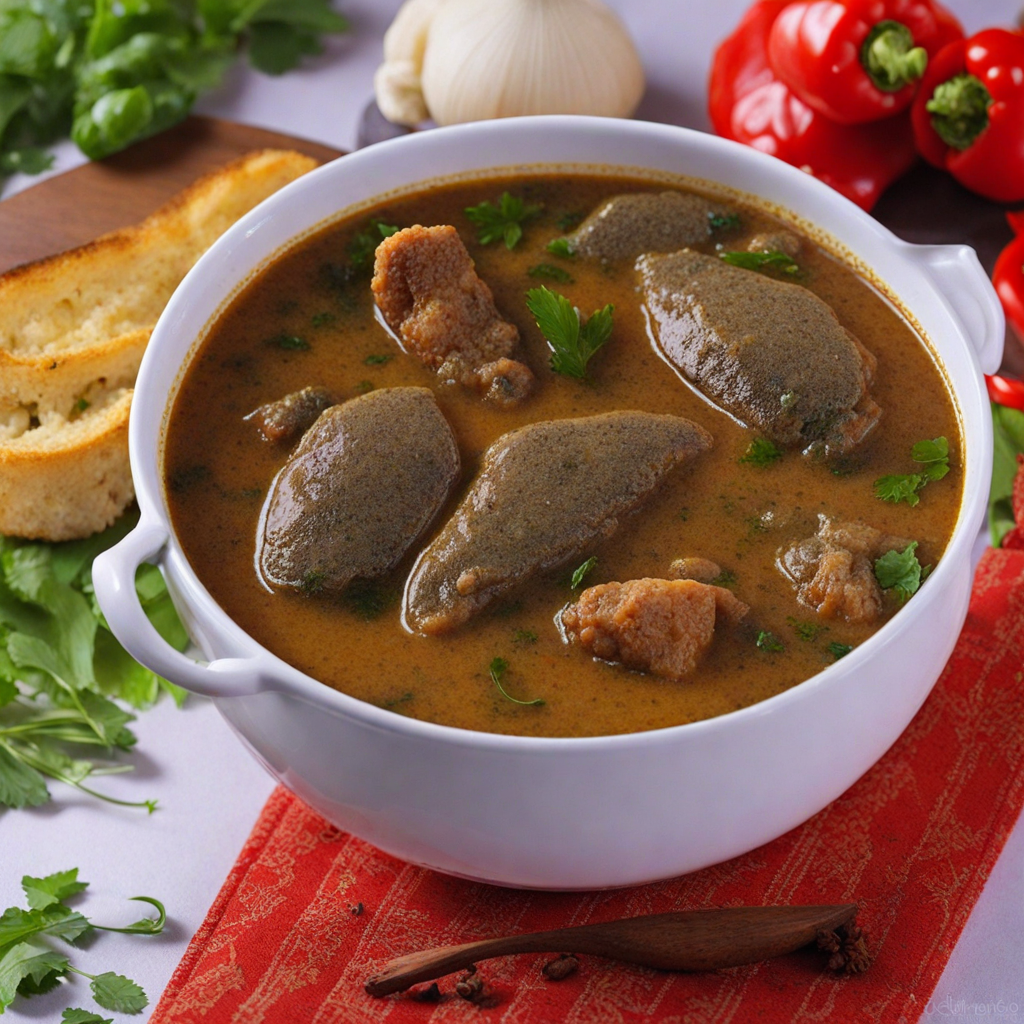Groundnut Soup
Groundnut Soup, also known as Peanut Soup, is a rich and hearty dish that is a staple in Nigerian cuisine. The main ingredient, groundnuts (or peanuts), lend a creamy and nutty flavor that is truly unique. The soup is typically made by blending roasted groundnuts into a smooth paste, which is then cooked with a variety of spices and seasonings. Commonly added ingredients include onions, tomatoes, and chili peppers, which introduce a gentle heat and aromatic depth, making each spoonful a delightful experience for the palate. What sets Groundnut Soup apart is its versatility; it can be enjoyed with various accompaniments, such as rice, fufu, or even yam. The soup's consistency can range from thick and stew-like to a lighter broth, depending on personal preference. The combination of the nutty flavor and the savory spices creates a comforting dish that warms the soul, making it perfect for sharing with family and friends during gatherings or special occasions. In addition to its rich taste, Groundnut Soup is also packed with nutritional benefits. Groundnuts are a great source of protein, healthy fats, and essential vitamins, contributing to a balanced meal. The soup can be customized to suit different dietary needs, whether vegetarian or with the addition of meats like chicken or goat. With its delightful flavor profile and hearty nature, Groundnut Soup is an excellent dish for anyone looking to explore the diverse and delicious world of Nigerian cuisine.
How It Became This Dish
The Rich History of Groundnut Soup in Nigeria Groundnut soup, also known as peanut soup or "Nkatekwan" in some Nigerian dialects, is a beloved dish with deep cultural roots and historical significance in Nigeria and across West Africa. This hearty and flavorful soup, primarily made from groundnuts (peanuts), showcases the rich culinary traditions of the region and serves as a testament to the fusion of indigenous ingredients and culinary practices over time. #### Origins of Groundnut Soup The groundnut, native to South America, is believed to have been brought to Africa by Portuguese traders in the 16th century. However, it is in West Africa, particularly Nigeria, that the legume truly flourished. The favorable climate and soil conditions allowed for the cultivation of groundnuts, which quickly became a staple crop, particularly in regions such as the northern parts of Nigeria. The preparation of groundnut soup can be traced back to ancient societies where communal cooking and shared meals were integral to social life. As agriculture developed, the use of locally sourced ingredients became a hallmark of Nigerian cuisine. Groundnut soup emerged as a popular dish due to its rich flavor, nutritional value, and the versatility of peanuts as an ingredient. It is often prepared with various proteins, such as chicken, beef, or fish, and is enjoyed with rice or fufu, a staple carbohydrate in Nigerian diets. #### Cultural Significance Groundnut soup holds significant cultural importance in Nigeria. It is not just a meal; it is a symbol of hospitality and community. In many Nigerian cultures, sharing food is a way to forge connections and celebrate relationships. Groundnut soup is often served during special occasions, family gatherings, and communal feasts, making it a dish associated with joy and togetherness. Furthermore, groundnuts themselves have become emblematic of Nigerian agricultural success. The crop is a major export and plays a key role in the livelihoods of many farmers across the country. Groundnut soup, therefore, also represents economic resilience, as it reflects the ability of local farmers to cultivate and market a product that has become integral to both domestic and international cuisines. The dish is not limited to one ethnic group or region; rather, it transcends cultural boundaries, with various communities offering their unique twists on the recipe. For instance, the Yoruba people might prepare it with a different blend of spices compared to the Igbo or Hausa traditions. This diversity highlights how groundnut soup has become a canvas for regional flavors and culinary practices. #### Development Over Time Over the centuries, groundnut soup has evolved in response to changing tastes, availability of ingredients, and culinary influences. The introduction of new spices and cooking techniques during the colonial period enriched the flavor profile of the soup. For example, the incorporation of spices such as ginger, garlic, and chili peppers added layers of complexity to the dish. The advent of globalization has also influenced the preparation and presentation of groundnut soup. In modern Nigerian cuisine, chefs and home cooks alike are experimenting with fusion elements, incorporating ingredients from other cultures while maintaining the essence of the traditional dish. This has led to the emergence of variations such as spicy groundnut stew, which adds a kick to the classic recipe. As Nigeria has become more urbanized, the accessibility of groundnut soup has also changed. While it remains a staple in rural areas, where it is often prepared from scratch using fresh, locally sourced ingredients, urban dwellers can find it in restaurants, food stalls, and even as a frozen or packaged product. This shift reflects broader trends in food consumption, where convenience often meets tradition. In addition to its culinary evolution, groundnut soup has also garnered attention in the realm of health and nutrition. Peanuts are rich in protein, healthy fats, and essential vitamins, making groundnut soup not only a comfort food but also a nutritious option. As health consciousness grows, many are rediscovering the benefits of traditional dishes like groundnut soup, often emphasizing the importance of whole, unprocessed ingredients. #### Groundnut Soup in Contemporary Nigerian Society Today, groundnut soup continues to be a cherished dish among Nigerians, both at home and in the diaspora. It serves as a nostalgic reminder of home for many who have moved abroad, with recipes being passed down through generations. Social media platforms have also played a significant role in popularizing traditional dishes like groundnut soup, as food bloggers and chefs showcase their own interpretations, allowing for a revival of interest in Nigerian cuisine. Moreover, there is a growing movement within Nigeria to celebrate and preserve traditional foods in the face of globalization. Culinary festivals, cooking classes, and food documentaries are bringing attention to the importance of groundnut soup and similar dishes, emphasizing their role in cultural identity and heritage. #### Conclusion Groundnut soup is more than just a dish; it is a reflection of Nigeria's rich history, diverse cultures, and evolving culinary landscape. From its humble origins as a local food to its status as a beloved staple in both homes and restaurants, groundnut soup encapsulates the essence of Nigerian hospitality and community spirit. As it continues to adapt and thrive in contemporary society, it stands as a delicious testament to the resilience and creativity of Nigerian cuisine. Whether enjoyed in its traditional form or reimagined with modern flair, groundnut soup will undoubtedly remain a cherished part of Nigeria's culinary narrative for generations to come.
You may like
Discover local flavors from Nigeria







